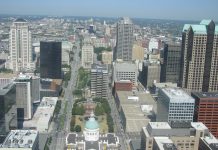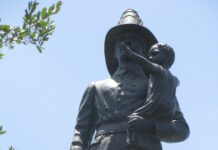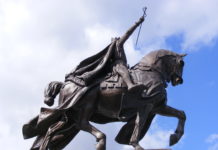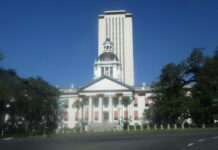Photo credit: DiasporaEngager (www.DiasporaEngager.com).
Interviewer: Jillian York
*This interview has been edited for length and clarity.
Robert Ssempala is a longtime press freedom and social justice advocate. He serves as Executive Director at Human Rights Network for Journalists-Uganda, a network of journalists in Uganda working towards enhancing the promotion, protection, and respect of human rights through defending and building the capacities of journalists, to effectively exercise their constitutional rights and fundamental freedoms for collective campaigning through the media. Under his leadership, his organization has supported hundreds of journalists who have been assaulted, imprisoned, and targeted in the course of their work.
York: What does free speech or free expression mean to you?
It means being able to give one’s opinions and ideas freely without fear of reprisals or without fearing facing criminal sanctions, and without being concerned about how another feels about their ideas or opinions. Sometimes even if it’s offensive, it’s one’s opinion. For me, it’s entirely how one wants to express themselves that is all about having the liberty to speak freely.
York: What are the qualities that make you passionate about free expression?
For me, it is the light for everyone when they’re able to give their ideas and opinions. It is having a sense of liberty to have an idea. I am very passionate about listening to ideas, about everyone getting to speak what they feel is right. The qualities that make me passionate about it are that, first, I’m from a media background. So, during that time I learned that we are going to receive the people’s ideas and opinions, disseminate them to the wider public, and there will be feedback from the public about what has come out from one side to the other. And that quality is so dear to my heart. And second, it is a sense of freedom that is expressed at all levels, in any part of the country or the world, being the people’s eyes and ears, especially at their critical times of need.
York: I want to ask you more about Uganda. Can you give us a short overview of what the situation for speech is like in the country right now?
The climate in Uganda is partly free and partly not free, depending on the nature of the issues at hand. Those that touch civil and political rights are very highly restricted and it has attracted so many reprisals for those that seek to express themselves that way. I work for the Human Rights Network for Journalists-Uganda (HRNJ-Uganda) which is a non-governmental media rights organization, so we monitor and document annually the incidents, trends, and patterns touching freedom of expression and journalists’ rights. Most of the cases that we have received, documented, and worked on are stemming from civil and political rights. We receive less of those that touch economic, social, and cultural rights. So depending on where you’re standing, those media houses and journalists that are critically independent and venture into investigative practices are highly targeted. They have been attacked physically, their gadgets have been confiscated and sometimes even damaged deliberately. Some have lost their jobs under duress because a majority of media ownership in this country is by the political class or lean toward the ruling political party. As such, they want to be seen to be supportive of the regime, so they kind of tighten the noose on all freedom of expression spaces within media houses and prevail over their journalists. This by any measure has led to heightened self-censorship.
But also, those journalists that seem to take critical lines are targeted. Some are even blacklisted. We can say that from the looks of things that times around political campaigns and elections are the tightest for freedom of expression in this country, and most cases have been reported around such times. We normally have elections every five years. So every three years after an election electioneering starts. And that’s when we see a lot of restrictions coming from the government through its regulation bodies like the Uganda Communications Commission, which is the communications regulator in my country. Also from the Media Council of Uganda, which was put in place by an act of Parliament to oversee the practices of media. And from the police or security apparatus in this country. So it’s a very fragile environment within which to practice. The journalists operate under immense fear and there are very high levels of censorship. The law has increasingly been used to criminalize free speech. That’s how I’d describe the current environment.
York: I understand that the Computer Misuse Act as well as cybercrime legislation have been used to target journalists. Have you or any of your clients experienced censorship through abuse of computer crime laws?
We have a very Draconian law called the Computer Misuse Amendment Act. It was amended just last year to make it even worse. It has been now the walking stick of the proponents of the regime that don’t want to be subjected to public scrutiny, that don’t want to be held accountable politically in their offices. So abuses of public trust and power of their offices are hidden under the Computer Misuse Amendment Act. And most journalists, most editors, most managers have been, from time to time, interrogated at the Criminal Investigations Directorate of the police over what they have written about the powerful personalities especially in the political class – sometimes even from the business class – but mainly it’s from the political class. So it is used to insulate the powerful from being held accountable. Sadly, most of these cases are politically motivated. Most of them have not even ended up in courts of law, but have been used to open up charges against the media practitioners who have, from time to time, kept reporting and answering to the police for a long time without being presented to court or that are presented at a time when they realize that the journalists in question are becoming a bit unruly. So these laws are used to contain the journalists.
Since most of the stories that have been at the highlight of the regime have been factual, they have not had reason to run to Court, but the effect of this is very counterproductive to the journalists’ independence, to their ability to concentrate on more stories – because they’re always thinking about these cases pending before them. Also, media houses now become very fearful and learn how to behave to not be in many cases of that nature. So the Computer Misuse Act, criminal defamation and now the most recent one, the Anti-Homosexuality Act (AHA) – which was passed by Parliament with very drastic clauses– are clawback legislation for press freedom in Uganda. The AHA in itself fundamentally affected the practice of journalism. The legislation falls short of drawing a clear distinction between what amounts to promotion or education [with regards to sharing material related to homosexuality]. Yet one of the crucial roles of the media is to educate the population about many things, but here, it’s not clear when the media is promoting and when it is educating. So it wants to slap a blackout completely on when you’re discussing the LGBTQI+ issues in the country. So, this law is very ambiguous and therefore susceptible to abuse at the expense of freedom speech
And it also introduces very drastic sanctions. For instance, if one writes about homosexuality their media operating license is revoked for ten years. And I’m sure no media house can stand up again after ten years of closure and can still breathe life. Also, the AHA generalizes the practice of an individual journalist. If, for instance, one of your journalists writes something that the law looks at as against it, the entire media house license is revoked for ten years, but also you’re imprisoned for five years – you as the writer. In addition, you receive a hefty fine of the equivalent of 1 billion Uganda shillings, that’s about 250,000 euros. Which is really too much for any media house operating in Uganda.
So that alone has created a lot of fear to discuss these issues, even when the law was passed in such a rushed manner with total disregard for the input of key stakeholders like the media, among others. As a media rights organization, we had looked at the draft bill and we were planning to make a presentation before the Parliamentary Committee. But within a week they closed all public hearings opinions, which limited the space for engagement. Within a few days the law had been written, presented again, and then assented to by the President. No wonder it’s being challenged in the Constitutional Court. This is the second time actually that such a law has been challenged. Of course, there are many other laws, like the Anti-Terrorism Act, which has not clearly defined the role of a journalist who speaks to a person who engages in subversive activities as terrorism. Where the law presupposes that before interviewing a person or before hosting them in your shows, you must have done a lot of background checks to make sure they have not engaged in such terrorism acts. So if you do not, the law here presses a criminal liability on the talk show host for promoting and abetting terrorism. And if there’s a conviction, the ultimate punishment is being sentenced to death. So these couple of laws are really used to curtail freedom of expression.
York: Wow, that’s incredible. I understand how this impacts media houses, but what would you say the impact is on ordinary citizens or individual activists, for example?
Under the Computer Misuse Amendment Act, the amended Act is restrictive and inhibitive to freedom of expression in regards to citizen journalism. It introduces such stringent conditions, like, if I’m going to record a video of you, say that I’m a journalist, citizen journalist or an activist who is not working for a media house, I must seek your permission before I record you in case you’re committing a crime. The law presupposes that I have no right to record you and later on disseminate the video without your explicit permission. Notably, the law is silent on the nature of the admissible permission, whether it is an email, SMS, WhatsApp, voice note, written note, etc. Also, the law presupposes that before I send you such a video, I must seek for your permission as the intended recipient of the said message. For instance, if I send you an email and you think you don’t need it, you can open a case against me for sending you unsolicited information. Unsolicited information – that’s the word that’s used.
So the law is so amorphous in this nature that it completely closes out the liberty of a free society where citizens can engage in discussions, dialogues, or give opinions or ideas. For instance, I could be a very successful farmer, and I think the public could benefit from my farming practices, and I record a lot of what I do and I disseminate those videos. Somebody who receives this, wherever they are, can run to court and use this amended Computer Misuse Act to open up charges against me. And the fines are also very hefty compared to the crimes that the law talks about. So it is so evident that the law is killing citizen journalism, dissent, and activism at all levels. The law does not seem to cater to a free society where the individual citizens can express themselves at any one time, can criticize their leaders, and can hold them accountable. In the presence of this law, we do not have a society that can hold anyone accountable or that can keep the powerful in check. So the spirit of the law is bad. The powerful fence themselves off from the ordinary citizens that are out there watching and not able to track their progress of things or raise red flags through the different social media platforms. But we have tried to challenge this law. There is a group of us, 13 individual activists and CSOs that have gone to the Constitutional Court to say, “this law is counterproductive to freedom of expression, democracy, rule of law and a free society.” We believe that the court will agree with us given its key function of promoting human rights, good governance, democracy, and the rule of law.
York: That was my next question- I was going to ask how are people fighting against these laws?
People are very active in terms of pushing back and to that extent we have many petitions that are in court. For instance, the Computer Misuse Amendment is being challenged. We had the Anti-pornographic Act of 2014 which was so amorphous in its nature that it didn’t clearly define what actually amounts to pornography. For instance, if I went around people in a swimming pool in their swimming trunks and took photos and carried those in the newspaper or on TV, that would be promoting pornography. So that was counterproductive to journalism so we went to court. And, fortunately, a court ruled in our favor. So the citizens are really up in arms to fight back because that’s the only way we can have civic engagements that are not restricted through a litany of such laws. There has been civic participation and engagement through mass media, dialogues with key actors, among others. However, many fear to speak out due to fear of reprisals, having seen the closure of media houses, the arrest and detention of activists and journalists, and the use of administrative sanctions to curtail free expression.
York: Are there ways in which international groups and activists can stand in solidarity with those of you who are fighting back against these laws?
There’s a lot of backlash on organizations, especially local ones, that tend to work a lot with international organizations. The government seems to be so threatened by the international eye as compared to local eyes, because recently it banned the UN Human Rights Office. They had to wind up business and leave the country. Also, the offices of the Democratic Governance Facility (DGF), which was a basket of embassies and the EU that were the biggest funding entity for the civil society. And actually for the government, too, because they were empowering citizens, you know, empowering the demand side to heighten its demand for services from the supply side. The government said no and they had to wind up their offices and leave. This has severely crippled the work of civil society, media, and, generally, governance.
The UN played an important role before they left and we now have that gap. Yet this comes at a time when our national Uganda Human Rights Commission is at its weakest due to a number of structural challenges characterizing it. The current leadership of the Commission is always up in arms against the political opposition for accusing government of committing human rights excesses against its members. So we do our best to work with international organizations through sharing our voices. We have an African Hub, like the African IFEX, where the members try to replicate voices from here. In that nature we do try a lot, but it’s not very easy for them to come here and do their practices. Just like you will realize a lot of foreign correspondents, foreign journalists, who work in Uganda are highly restricted. It’s a tug of war to have their licenses renewed. Because it’s politically handled. It was taken away from the professional body of the Media Council of Uganda to the Media Centre of Uganda, which is a government mouthpiece. So for the critical foreign correspondents their licenses are rarely renewed. When it comes to election times most of them are blocked from even coming here to cover the elections. The international media development bodies can help to build capacities of our media development organizations, facilitate research, provide legal aid support, and engage the government on the excesses of the security forces and some emergency responses for victims, among others.
York: Is there anything that I didn’t ask that you’d like to share with our readers?
One thing I was to add is about trying to have an international focus on Uganda in the build up to elections. There’s a lot of havoc that happens to the citizens, but most importantly, to the activists and human rights defenders. Either cultural activists or media activists- a lot happens. And most of these things are not captured well because it is prior to the peak of campaigns or there is fear by the local media of capturing such situations. So by the time we get international attention, sometimes the damage is really too irreparable and a lot has happened. As opposed to if there was that international focus from the world. To me, that should really be captured because it would mitigate a lot that has happened.
Source of original article: Electronic Frontier Foundation (EFF) / Deeplinks (www.eff.org).
The content of this article does not necessarily reflect the views or opinion of Global Diaspora News (www.GlobalDiasporaNews.com).
To submit your press release: (https://www.GlobalDiasporaNews.com/pr).
To advertise on Global Diaspora News: (www.GlobalDiasporaNews.com/ads).
Sign up to Global Diaspora News newsletter (https://www.GlobalDiasporaNews.com/newsletter/) to start receiving updates and opportunities directly in your email inbox for free.






























